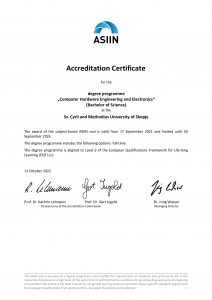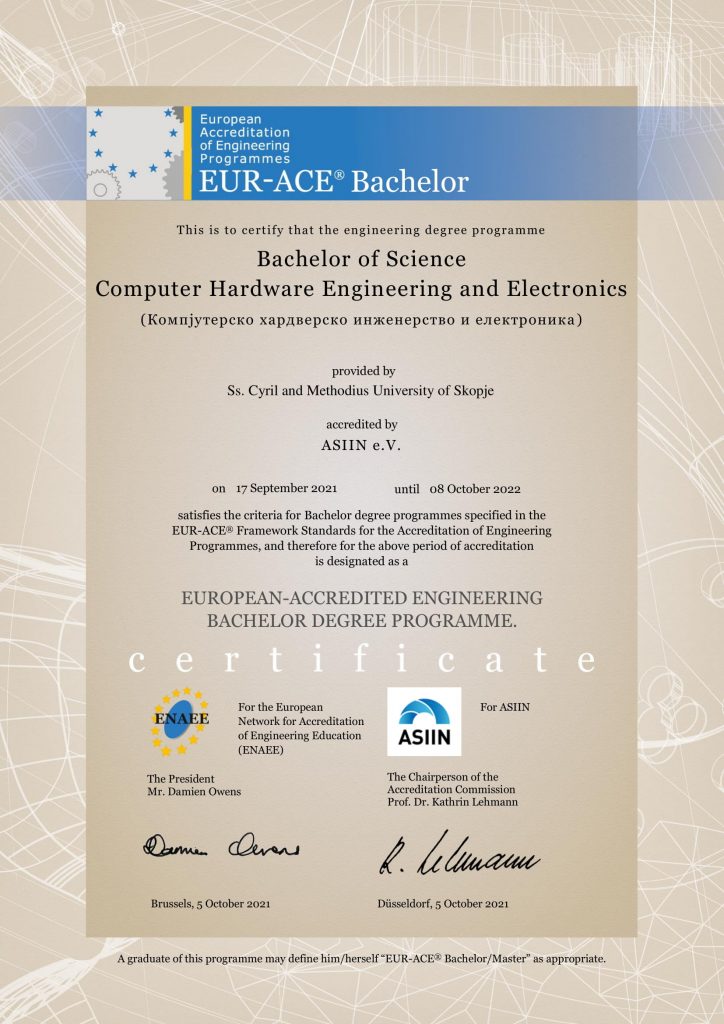ObjectivesLearning outcomesIIIIIIIVVVIVIIVIIIElective Courses
Study Programme
Computer Hardware Engineering and Electronics
Degree Programme
First cycle degree programme
Level of qualification
Bachelor of Science in Electrical Engineering and Information Technologies, in Computer Hardware Engineering and Electronics
Occupational Profiles of Graduates
Engineers of this profile can build their career in companies that design complete solutions based on microprocessor systems (embedded systems for data acquisition, mobile devices, microcontrollers for control and automation in industry, communication equipment, etc.), and in every company that utilizes computers and other electronic equipment.
The Programme Learning Outcomes
The CHEE study programme represents optimal combination of electronics and computer engineering. Combination of knowledge and skills from these two disciplines is a base for creation of high quality engineers, capable of coping with the challenge called complete hardware-software solution. The knowledge in the field of architectures, algorithms and concepts of computer systems, which are offered by the computer hardware engineering, combined with knowledge from the field of electronics (analog design, VLSI design, PLD and FPGA components, microelectronics), will enable the engineer to design products fast, efficient and accurate. The students of this programme will have the opportunity through the elective courses to acquire knowledge in the field of digital signal processing, audio, image and video processing, multimedia systems, biomedical engineering, electromagnetics, electromagnetic waves, antennas and radio engineering.
International Accreditation
The first cycle study programs at FEEIT are accredited by the German Accreditation Agency for Study Programmes in Engineering, Informatics, Natural Sciences and Mathematics (ASIIN), which is a world leader in quality assurance in higher education. This accreditation confirms that the study programs satisfies the criteria for Bachelor degree programs specified in EUR-ACE Framework standards for the accreditation of engineering programs and the content studied are relevant to areas covered in study programs.


General Learning Outcomes
| Knowledge and understanding |
- Demonstrate knowledge and understanding in the scientific field of electrical engineering, based on education and training, including knowledge of theoretical, practical, conceptual, comparative, and critical perspectives in the scientific field according to the appropriate methodology.
|
| Application of knowledge and understanding |
- Demonstrate the ability to apply acquired knowledge and understanding in a professional manner.
- An ability to identify, analyze and solve complex engineering problems by selecting an appropriate method.
|
| Ability to assess |
- An ability to collect, analyze, evaluate and present information, ideas, and concepts based on relevant data.
- Making an appropriate assessment taking into account personal, social, scientific and ethical aspects.
|
| Communication skills |
- An ability to communicate effectively in both verbal and written forms with professional and non-professional audiences.
- An ability to work effectively as an individual or as a member of a team taking shared responsibility for collective results.
- Ability to participate independently, in a professional manner, in regards to scientific and interdisciplinary discussions.
|
| Learning skills |
- Commitment to the professional development and lifelong learning achieved through higher education, technical training, membership in professional societies, and other activities in order to update already acquired knowledge in the relevant field to achieve continuous professional growth.
- An ability to acquire and apply new knowledge as needed using appropriate learning strategies.
|
Specific Learning Outcomes
| Knowledge and understanding |
- Demonstrate knowledge and understanding in the scientific field of electrical engineering, based on education and training, including knowledge of theoretical, practical, conceptual, comparative, and critical perspectives in the scientific field according to the appropriate methodology.
- Demonstrates knowledge and understanding of research, development, and application of knowledge in computer hardware engineering and electronics, as well as engineering design in industrial processes.
- Understanding and knowledge of current issues related to scientific research and new sources of knowledge.
|
| Application of knowledge and understanding |
- An ability to identify, analyze and solve complex engineering problems.
- An ability to apply knowledge and understanding in a way that demonstrates professionalism to given task.
- An ability to understand, identify, analyze and solve problems related to computer hardware engineering and electronics.
|
| Ability to assess |
- An ability to collect, analyze, evaluate and present information, ideas and concepts from relevant data.
- Making an appropriate assessment taking into account personal, social, scientific and ethical aspects.
- An ability to provide answers to both theoretical and practical issues, in order to give explanations and choose the appropriate solution.
- An ability to collect, analyze, and to evaluate information, ideas and concepts from relevant data in the field of computer hardware engineering and electronics.
|
| Communication skills |
- An ability to communicate effectively in both verbal and written forms with professional and non-professional audiences.
- An ability to work effectively as an individual or as a member of a team taking shared responsibility for collective results.
- An ability to participate independently and professionally in specific, scientific and interdisciplinary discussions.
|
| Learning skills |
- Commitment to professional development and lifelong learning through higher education, technical training, membership in professional societies, and other activities in order to update already acquired knowledge in the field and to achieve continuous professional growth.
- An ability to acquire and apply new knowledge as needed, using appropriate learning strategies.
- Demonstrate a high degree of independence initiative for learning and professional development.
- Understanding the need for learning and ability for continuous professional development, through the use of professional and scientific literature, professional training, continuing formal education, membership in professional organizations, etc.
- Awareness of new technologies and an ability to evaluate and use modern software development tools.
- An ability to use information technologies for distance and e-learning.
- Skills for cooperative, competitive and individual learning.
- Applying active teaching and learning techniques.
|
| During studying, the student may choose up to 4 courses from the faculty list of electives |
| During studying, the student may choose up to 4 courses from the faculty list of electives |
| During studying, the student may choose up to 4 courses from the faculty list of electives |
| During studying, the student may choose up to 4 courses from the faculty list of electives |
| During studying, the student may choose up to 4 courses from the faculty list of electives |
| During studying, the student may choose up to 4 courses from the faculty list of electives |





